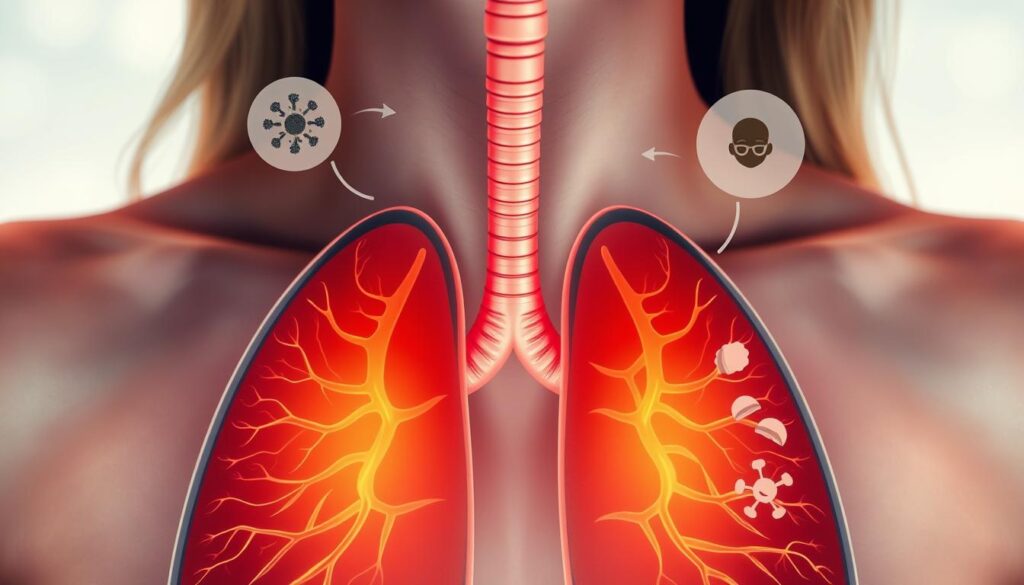Ever had a laugh turn into a wheeze? It’s a common surprise. Wheezing after laughing can worry us, making us think about our breathing. Our bodies send us signals, and knowing why we wheeze when we laugh is key to staying healthy.
Wheezing when we laugh is more than just a one-time thing. It might mean our lungs are trying to tell us something. It could be due to allergies, asthma, or other health issues. This article will look into why we wheeze when we laugh and offer ways to breathe better.
Key Takeaways
- Wheezing during laughter can indicate various respiratory conditions
- Understanding triggers is essential for managing respiratory health
- Multiple factors can contribute to breathing difficulties with laughter
- Professional medical advice is crucial for persistent symptoms
- Lifestyle changes can help reduce the frequency of wheezing episodes
Understanding Wheezing: An Overview
Wheezing can be puzzling and scary, like when it happens during laughter. Our breathing system is complex. Knowing how breathing problems with laughter work can help us stay healthy.
Many people face breathing issues during laughter. These problems can come from different health issues that affect our airways.
What is Wheezing?
Wheezing is a high-pitched whistling sound when we breathe. It shows our airways are restricted. This sound is more noticeable during activities that change how we breathe, like intense laughter.
- Characterized by a squeaky or musical sound while breathing
- Often occurs during exhaling
- Can be a sign of underlying respiratory conditions
Common Symptoms Associated with Wheezing
Knowing the symptoms of wheezing after laughing helps us understand our breathing better. These symptoms might include:
- Shortness of breath
- Chest tightness
- Difficulty catching your breath
- A whistling sound when exhaling
“Understanding our body’s signals is the first step toward better respiratory health.” – Respiratory Health Experts
While wheezing can be worrying, many cases can be managed. This is with the right medical advice and lifestyle changes.
The Mechanics of Laughter and Breathing
Laughter is a complex response that affects our breathing. Our body changes in funny moments, linking breathing with emotions.
Knowing how laughter affects breathing helps us see why some people have trouble breathing when they laugh. It involves fast air movement and muscle contractions that can lead to unexpected breathing responses.
How Laughter Influences Breathing Patterns
Laughter changes our breathing system a lot:
- Diaphragm muscles contract quickly
- Breathing becomes irregular and intense
- Air exchange rates increase a lot
The Role of the Respiratory System During Laughter
Wheezing during laughter can be caused by many things. Some people face breathing challenges because of health issues that get worse when they’re very emotional.
| Respiratory Response | Typical Characteristics |
|---|---|
| Normal Breathing | Steady, controlled air exchange |
| Laughter Breathing | Rapid, irregular air movement |
| Potential Triggers | Muscle tension, emotional intensity |
“Laughter is a powerful physiological experience that transforms our breathing in unexpected ways.” – Respiratory Health Institute
Our breathing system changes a lot during laughter. It creates a special connection between feeling emotions and our body’s response. Knowing this can help people deal with breathing problems.
Common Causes of Wheezing When Laughing
Wheezing during laughter can be surprising and worrying. Our lungs react to many things, making some people more likely to wheeze when they laugh. Knowing why helps us take better care of our breathing.
Allergies and Asthma
Asthma and wheezing from laughter are closely linked. Those with allergic asthma might have airways that suddenly narrow during intense laughter. This happens when:
- Airways become too sensitive
- Muscles in the airways tighten
- Inflammation causes breathing problems
Respiratory Conditions
Many lung issues can lead to wheezing when laughing. Medical reasons for wheezing after laughter include:
| Condition | Symptoms |
|---|---|
| Chronic Bronchitis | Persistent cough, mucus production |
| Reactive Airway Disease | Breathing difficulties during physical activities |
| Restrictive Lung Diseases | Reduced lung capacity |
Anxiety and Stress
Psychological factors greatly affect our breathing. Stress-induced breathing patterns can cause wheezing, like during emotional laughter. Deep breathing and managing stress can help reduce these symptoms.
“Laughter is the best medicine, but not when it triggers respiratory distress.” – Respiratory Health Expert
Exploring Allergic Reactions
Allergic reactions can surprise us by causing wheezing when we laugh. Our immune system reacting too strongly to certain substances can lead to airway inflammation. This inflammation can cause us to wheeze unexpectedly.

How Allergies Trigger Wheezing
When we meet an allergen, our body releases chemicals that cause airway inflammation. This can make us wheeze, even when we laugh. The muscles around our airways tighten, narrowing the breathing passages and creating that distinctive whistling sound.
- Inflammation narrows air passages
- Immune system overreacts to triggers
- Respiratory muscles constrict
Common Allergens That Affect Us
Identifying potential allergen triggers is key to understanding why we might wheeze when we laugh. Some common culprits can surprise us.
| Allergen Category | Common Triggers | Potential Respiratory Impact |
|---|---|---|
| Environmental | Pollen, Dust Mites | High likelihood of breathing difficulties |
| Food-Related | Nuts, Dairy, Eggs | Potential immediate respiratory response |
| Animal-Related | Pet Dander, Fur | Immediate airway constriction |
“Understanding your body’s unique allergic responses can help manage unexpected wheezing during moments of joy.” – Respiratory Health Experts
If you experience persistent wheezing during laughter, seeing an allergist is a good idea. They can give you insights into your specific respiratory sensitivities.
The Link Between Asthma and Laughter
Laughter is a powerful emotion that can sometimes trigger unexpected respiratory responses. For individuals with asthma, the connection between laughter and breathing can be complex. Wheezing from laughter is not just a quirky occurrence but a genuine medical phenomenon that many people experience.
Understanding Asthma Triggers
Asthma and wheezing from laughter can be closely interconnected. Our respiratory system responds to various stimuli, and intense laughter can act as a potential trigger for bronchial spasms from laughter. These unexpected reactions occur due to several factors:
- Rapid breathing during intense laughter
- Sudden changes in air pressure
- Emotional and physical stress on the respiratory system
Wheezing as a Symptom of Asthma
When laughter causes wheezing, it signals that our airways might be sensitive. Bronchial spasms from laughter can manifest as a tightening sensation in the chest, accompanied by a whistling sound when breathing.
“Laughter is the best medicine, except when it triggers asthma symptoms.” – Respiratory Health Expert
| Asthma Trigger | Potential Impact |
|---|---|
| Intense Laughter | Can cause bronchial constriction |
| Emotional Excitement | May increase respiratory sensitivity |
| Rapid Breathing Patterns | Potential asthma symptom escalation |
Understanding these connections helps us manage our respiratory health more effectively. If you frequently experience wheezing during laughter, consulting a healthcare professional can provide personalized insights and management strategies.
Environmental Factors Contributing to Wheezing
Our environment greatly affects our breathing, which is key for those with lung issues. Knowing what environmental triggers are can help us better manage our breathing problems.
Pollutants and Irritants in Our Environment
Every day, we breathe in pollutants that can harm our lungs. These irritants make lung conditions worse, like wheezing when we laugh:
- Industrial air pollution
- Vehicle exhaust emissions
- Cigarette smoke
- Chemical cleaning products
- Dust and pet dander

Seasonal Changes and Their Impact on Breathing
Seasons change, and so do our breathing challenges. Each season brings its own set of problems for our lungs:
| Season | Respiratory Challenges | Potential Triggers |
|---|---|---|
| Spring | Increased allergies | Pollen, blooming plants |
| Summer | High humidity | Mold, heat-related breathing difficulties |
| Fall | Ragweed and mold spores | Increased allergen exposure |
| Winter | Cold, dry air | Indoor allergens, respiratory infections |
“Our environment is a silent contributor to respiratory health, influencing how we breathe and laugh.” – Respiratory Health Association
Protecting ourselves from environmental triggers requires awareness and proactive management of our respiratory health.
When to Seek Medical Attention
Wheezing when you laugh can be worrying. Sometimes, it might not be a big deal. But, some signs mean you should see a doctor. Knowing when to get help is key to keeping your lungs healthy.
Laughing can make you wheeze, and it might mean there’s something wrong. Conditions like chronic obstructive pulmonary disease and wheezing during laughter are serious. They need your attention.
Identifying Severe Symptoms
Look out for these serious signs that mean you need to see a doctor right away:
- Persistent wheezing that lasts more than a few weeks
- Hard breathing with chest pain
- Wheezing that makes it hard to do everyday things
- Unexplained weight loss
- Coughing up blood
Importance of Early Diagnosis
Finding health problems early can stop them from getting worse. Doctors say it’s smart to get checked out if you keep having symptoms.
“Prevention is always better than cure. Timely medical intervention can significantly improve respiratory health outcomes.” – Dr. Emily Rodriguez, Pulmonary Specialist
| Symptom | Potential Indication | Recommended Action |
|---|---|---|
| Wheezing during laughter | Possible asthma or allergic reaction | Consult pulmonologist |
| Chronic cough | Potential respiratory infection | Complete medical examination |
| Shortness of breath | Possible lung function issues | Lung function testing |
Our lungs are complex, and we need doctors to figure out what’s going on. They help us get the right treatment.
At-Home Remedies for Wheezing
Feeling uncomfortable when you laugh because you wheeze is common. Many people look for ways to breathe better. We’ll show you simple steps to help you feel more comfortable.
Dealing with wheezing needs a few strategies. Learning how to breathe better can help a lot. It can make you feel more comfortable and improve your lung health.
Breathing Exercises to Minimize Wheezing
- Diaphragmatic breathing: Focus on deep, slow breaths from the belly
- Pursed-lip breathing: Inhale through the nose, exhale slowly through pursed lips
- Controlled coughing: Clear airways gently to reduce mucus buildup
Home Remedies That May Provide Relief
While these natural methods aren’t a cure-all, they can help. They can make you feel better when you wheeze:
- Stay hydrated with warm herbal teas
- Use a humidifier to moisten airways
- Practice relaxation techniques
“Breathing is the first act of life, and the last. Our very life depends on it.” – Elizabeth Brown
If you wheeze a lot, see a doctor. They can check for serious health issues.
| Remedy | Benefits | Frequency |
|---|---|---|
| Steam inhalation | Clears nasal passages | 2-3 times weekly |
| Ginger tea | Reduces inflammation | Daily |
| Breathing exercises | Improves lung capacity | 15 minutes daily |
Remember, how you react to these remedies can differ. Always listen to your body. And don’t hesitate to get medical advice when needed.
Medication Options for Managing Wheezing
Managing wheezing during laughter needs a full understanding of medical treatments. For those with asthma and wheezing from laughter, many medications can help. They can also improve breathing health.
Over-the-Counter Solutions
Looking into medical reasons for wheezing after laughter? There are many easy-to-get treatments:
- Antihistamine medications to reduce allergic responses
- Bronchodilator inhalers for quick respiratory relief
- Saline nasal sprays to clear breathing passages
Prescription Treatments
For ongoing wheezing, doctors might suggest more specific medicines:
| Medication Type | Primary Function | Typical Use |
|---|---|---|
| Corticosteroid Inhalers | Reduce airway inflammation | Long-term asthma management |
| Leukotriene Modifiers | Block inflammatory chemicals | Prevent breathing complications |
| Combination Inhalers | Blend bronchodilation and anti-inflammation | Comprehensive respiratory control |
“Understanding your specific respiratory needs is crucial in selecting the most effective medication.” – American Lung Association
It’s important to work with a healthcare provider. They can help find the best treatment for wheezing caused by laughter.
Lifestyle Changes to Reduce Wheezing
Managing wheezing during laughter needs a whole-life approach. Small changes can greatly affect our breathing. This helps us avoid those uncomfortable wheezing moments.

When we look into why we wheeze when we laugh, making lifestyle changes is key. Our daily habits can either make breathing harder or easier.
The Importance of Staying Hydrated
Drinking enough water is crucial for our breathing. Water:
- Thins out mucus
- Reduces airway inflammation
- Helps our lungs work better
- Prevents irritation in the respiratory tract
“Drink water like your breath depends on it” – Respiratory Health Experts
Avoiding Triggers in Our Daily Lives
Getting rid of things that can trigger wheezing is important. Here are some tips:
- Check the air quality at home
- Use air purifiers
- Clean your living space often
- Stay away from allergens
Remember, small lifestyle changes can lead to big improvements in breathing comfort and life quality.
Understanding Wheezing in Children
Wheezing in kids can worry parents, like when it happens after laughing. Our guide helps you grasp the world of kids’ breathing health.
Wheezing in kids is a serious issue that needs attention. Many parents get scared when their child’s breathing changes during play or when they’re upset.
Common Causes of Wheezing in Kids
- Asthma-related respiratory sensitivity
- Allergic reactions
- Viral respiratory infections
- Environmental irritants
Children’s airways are smaller and more delicate. This makes them more likely to have breathing problems. Wheezing can happen during laughter, play, or when they’re excited.
Treatment Options for Children
| Treatment Category | Specific Interventions |
|---|---|
| Medical Treatments | Pediatric inhaler therapy, allergy medications |
| Environmental Management | Air purifiers, reducing allergen exposure |
| Lifestyle Adjustments | Regular exercise, balanced nutrition |
Early detection and proper management are key to supporting children’s respiratory health.
It’s wise to talk to pediatric specialists. They can help create a plan to manage wheezing and keep kids’ breathing healthy.
The Role of Stress and Anxiety
Stress and anxiety can really affect our breathing, making us wheeze when we laugh. It’s important to understand how our mind affects our breathing. This knowledge helps us deal with wheezing better.
How Psychological Factors Trigger Respiratory Responses
Intense emotions can make our muscles tense and change how we breathe. This might be why some people wheeze when they laugh. Our autonomic nervous system is key in these changes.
- Stress hormones can trigger bronchial muscle constriction
- Anxiety may increase inflammation in respiratory pathways
- Emotional intensity can alter breathing rhythm
Coping Strategies to Reduce Stress-Related Wheezing
To tackle wheezing when we laugh, we need a few strategies. Relaxation techniques can help reduce breathing problems and improve control.
| Stress Reduction Technique | Respiratory Benefits |
|---|---|
| Deep Breathing Exercises | Improves lung capacity and reduces muscle tension |
| Meditation | Decreases stress hormone production |
| Regular Physical Activity | Enhances respiratory system resilience |
“Breathing is the first act of life, and the last. Our very life depends on it.” – Elizabeth Brown
Using these strategies can help us manage stress-related breathing issues. This way, we can laugh without wheezing.
Final Thoughts on Wheezing and Laughter
Understanding why we wheeze when we laugh is more than just a medical curiosity. Our respiratory health is closely tied to our overall well-being. Breathing difficulties with laughter can be a sign that our body needs attention.
Respiratory issues related to wheezing during laughter shouldn’t cause panic. But they do need careful consideration. We’ve looked at many factors, from allergies and stress to managing symptoms. It’s important to stay proactive about our health and listen to our body’s signals.
Embracing a Healthy Lifestyle
Maintaining good respiratory health involves several strategies. Regular exercise, staying hydrated, managing stress, and avoiding environmental triggers can help. By making conscious lifestyle choices, we can reduce unexpected wheezing episodes during laughter.
Staying Informed About Our Health
Knowledge is our most powerful tool in managing respiratory challenges. Regular check-ups and understanding our health history are key. Each person’s respiratory experience is unique, so what works for one might not work for another.







